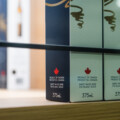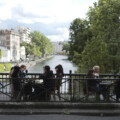This column is being written at more than 2,000 metres above sea level, looking over the Wasatch Range of the Rocky Mountains and Park City, Utah. There is no wine production that I can see from my vista, though the local craft beer is pretty good. Maybe it’s the thin air or the quality of light in the dry mountain air, but the scenery has brought to mind high-elevation wines.
The highest vineyard in the world is reportedly in Tibet, at over 3,500 meters. There are very high vineyards in the Andes too, like the 2,000 metre-high Jardin Occulto ones I wrote about in October of last year. In Europe, there are very high vines growing up into the valleys of the Alps and on the volcanic promontories of the Canary Islands (though that might technically be Africa).
The table I am writing from faces west, so in the morning the sun hits the mountain range head-on. After skiing through the day, the sun sinks behind it. During the day, as I ski, when the sun shines mostly from the south and hits the relief of snow depending both on the position of the hill (whether it faces east, south, or north) and also the steepness of the grade.
While skiing, I took a break to catch my breath in the thin Rocky Mountain air on the slopes and I was taken back to a lecture I attended in the fall of 2019 in another mountain town, Bolzano. There, in the valley of the Adige River, surrounded by the craggy peaks of the Dolomite Alps, I attended a lecture on mountain viticulture by the aptly named Professor Attila Scienza.
Scienza explained that there is a third aspect to terroir, or the conditions that a grapevine grows in, in addition to the two that get the most attention: soil type and climate. Scienza reminded his audience of wine journalists that plants require sunlight for photosynthesis and the advantage that mountain vines have is they get tend to get more of it than their counterparts on lower and flatter land.
Vines on steep grades get more sunshine because they aren’t in the shadow of many things. Ultraviolet rays from the sun might catch them from morning through to evening. Of course, the direction the slope faces is determinative, but one assumes the vines have been planted strategically to maximize, minimize, or find the right Goldilocks amount of sun.
Sunshine provides more than ultraviolet light—it also supplies warmth. All things being equal, the temperature will drop between half and one degree Celsius for every 100 metres of elevation. We know this instinctively from images of snow-peaked mountains in summer.
Elevation makes vine growing possible in parts of the world where the latitude is less than 30 degrees, and in low ground that would be too warm to grow vitas vinifera by virtue of being too close to the equator. Wine can be grown in places like South America and the Canary Islands.This column is avoiding the term “altitude” assiduously. The a-word, I have been told sternly, refers to objects in the air, like aeroplanes, and not the ground or things rooted in it.
The role elevation plays on climate made me think of another prominent and influential Italian gentleman in the wine world, Alessandro Masnaghetti. Masnaghetti is a wine writer but is most renowned for his skills as a map maker. His maps are instantly recognizable for their colourful patterns, which identify particular vineyards.
For the wine regions that commission Masnaghetti maps, like Barolo or Chianti Classico, they are an invaluable marketing tool. Since at least the famous Bordeaux classification of 1855, the value of one wine against the next has been inextricably linked to where it’s from. A vintner can tell potential customers where her wine comes from, and why the land she grows it on is ideally situated, or she can show them.
Recently Masnaghetti has upped his game and makes three-dimensional maps that are more like models. Now, the wine enthusiast can see clearly why a particular vineyard is higher or lower than the others or faces the sun at different times of the day in a particular way. Like Scienza, Masnaghetti understands sunshine is as important to terroir as soil and climate.

Agriculture is as sensitive to climate change as any human endeavour, and its subset of viticulture is especially vulnerable to warming. The vineyards on the north side of Mount Etna in Sicily are an interesting example. At an elevation of 800 to 1000 metres, the temperature in the Etna wine country can easily be 10 degrees cooler than on the streets of Catania at sea level.
Etna wines have gone from a marginal, local cottage industry, to a sought-after luxury brand. All the big wine houses in Sicily have invested in Etna, as have many from the mainland. Warmer growing seasons have meant an expansion of wine growing upwards on the mountain, and the ripening of the old vines is now all but guaranteed.
This is also true on a case-to-case basis throughout the wine-producing regions of the world, as producers look for cooler higher sites. It’s now common to see elevation described on the back label of a bottle of wine: “From vines grown at 400 metres above sea level”. Or the front, as some producers will include the vineyard elevation in the name of a wine, to show it’s come from a cooler corner of their appellation.
The mix of sunshine-derived concentration of flavour and freshness from cooler growing season temperatures have made high-elevation wines particularly marketable in the 2020s. Some of the best examples of this style are the wines from Argentina, which are grown in the clean air and strong sun of the high plateaus of Mendoza in the shadow of the Andes.
The wines from Itay’s Alto-Adige (or Sudtirol) often share this quality. In the south of France and north of Spain, wines from vineyards that are higher up into the foothills of the Pyrenees are also increasingly in demand. The trend is global, and in cooler regions the difference of just a few metres in elevation might be well enough to make a wine distinct from its lower-grounded neighbours.
Recommended for You

Matthew Grills: Joey Chestnut is America

Malcolm Jolley: The comfort of familiar favourites—or the fun of finding new wines?

Malcolm Jolley: An ‘Elbows Up’ wine project everyone can get behind

Malcolm Jolley: Need some summer wines? Look no further than the food-friendly, low-sugar sippers of the sunny Southern Rhône




